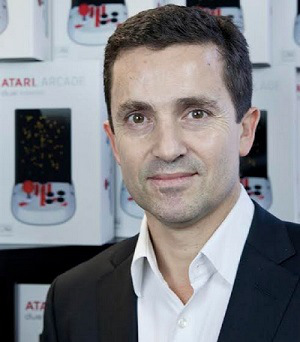Atari isn't the company it used to be. Nowadays, it's sponsoring World Cup videos about soccer superstar Pelé, partnering with Denny's for breakfast items like "hashteroids," and getting involved with real-money gambling through its classic games. 10 years ago, the former giant had more than 3,000 employees. In 2014, 11 people are running Atari, and CEO Frédéric Chesnais at the top.

The company's history is a labyrinth. The short version is Atari was founded by Nolan Bushnell and Ted Dabney in 1972, but the infamous video game crash of 1983 forced a major split that divided the company.
The arcade division became Atari Games, which was eventually sold to WMS Industries, who operated the popular Williams and Bally/Midway brands. But when Atari was separately resurrected as a brand on home consoles (which we'll get to soon), Atari Games became Midway Games West, and continued to make games before being shut down in 2003.
Everything from the Atari Consumer Electronics Division, the other half of the company, was sold to Commodore International founder Jack Tramiel and renamed Atari Corporation. Atari Corporation merged with JT Storage in 1996, but Hasbro Interactive stepped in and purchased the Atari parts in 1998, renaming the division Atari Interactive. Infogrames Entertainment, however, bought Hasbro in 2001, and slapped the Atari name on a few products before renaming its North American division Atari Inc. and its European division Atari Europe in 2003. Hasbro, weirdly, was renamed Atari Interactive.
The company did not do well in the years to come (remember when it acquired MMO developer Cryptic Studios?), and filed for chapter 11 bankruptcy in 2013 and sold off many of its franchises. It did hold on to some of its creations, however, including Centipede, Alone in the Dark, Asteroids, and others.
Chesnais is not new to Atari, having worked in various executive roles, including CEO, from 2001 until 2007. He left the company to form his own production studio, and oversaw the development of Jillian Michael fitness games and online titles such as Infestation: Survivor Stories. (That game is bad.)
When Atari filed for bankruptcy, it called Chesnais. He advised the company to move through bankruptcy, and said he'd be waiting on the other side.

"I’m the largest shareholder of Atari," he told me recently. " [...] We’re rebooting. I don’t have a three month plan. [laughs] I know it’s going to be more [of a] ten-year exercise. But I like it. I like the brand. This is why I bought the company back."
There was a playful, carefree way Chesnais talked about Atari during our conversation. It's not to suggest Chesnais isn't serious about resurrecting Atari, but if that doesn't happen, he may not lose much sleep, either. Ideas about what will and won't work for the company are fluid, ongoing, and subject to change.
The initiatives that define Chesnais' vision are varied, including relaunching old franchises with modern flourishes, taking advantage of the cultural appreciation for the Atari brand through licensing, keeping the company small by outsourcing, and finding new audiences.
"First thing we do is make the properties relevant in the 21st century with online and social features," he said.
Atari recently launched RollerCoaster Tycoon 4 on iOS. Reviews have been mixed, but it's just the first step. More franchises, including Asteroids, will follow. With the classic brands the company still controls, Chesnais wants a modern touch. Players have heard this talk before, though, and most games don't end up like Pac-Man Championship Edition. Thing is, Chesnais' audience probably isn't reading this article.
"It’s true we have targeted hardcore bases of fans with video games," he said. "But the guys playing Pong today, I don’t think you’d classify them as a hardcore gamer. I would say it’s more casual gamers."
But recent evidence suggests it's not ignoring the company's history. Atari launched Alone in the Dark on iOS last month. Atari also re-published the cult classic shooters Blood and Blood II on Steam, a series the company controls because of past buyouts involving Infogrames and GT Interactive.
But Chesnais recognizes there are precious few gaming brands prominent in pop culture, but Atari is one of them. If someone at a party is wearing an Atari t-shirt, it's unlikely anyone in the room will bat an eye.
"It’s true we have targeted hardcore bases of fans with video games. But the guys playing Pong today, I don’t think you’d classify them as a hardcore gamer. I would say it’s more casual gamers."
"I see people with an Atari t-shirt," he said. "I don’t see people with an X, Y, Z t-shirt. You can [say the] name of any publisher. Maybe Sony, maybe Nintendo. But do you see people wearing a Ubisoft t-shirt? Not a lot. [laughs]"
A press release from June suggested Atari would remain in the hardware business, citing a corporate interest in "gamified hardware and wearable devices."
"Atari is a hardware company," he said. "That’s the Atari 2600. This is in the DNA in the company. It’s more hardware than software. Just my view."
Just outside the orbit of video games, Atari is making a push into online gambling with Atari Casino, the result of a partnership with Seattle-based FlowPlay. Details on Atari Casino haven't been revealed just yet, but it's based on FlowPlay's successful Vegas World, an MMO-like virtual space with interactive experiences like swimming and shopping. Playable arcade games wouldn't seem out of place.
"We have made a small step into gambling with Atari Casino because that’s a super easy for us, I think," he said. "At least, it’s natural to make a small step from gaming to gambling."
You could probably write an entire article about that last statement.
These initiatives underscore Chesnais' desire to let others handle the heavy lifting. Chesnais views modern Atari as a manager seeking partners, whether building virtual worlds, new games, or licensing t-shirts. There's no interest in making Atari a company managing thousands of employees again. The goal is to stay nimble. Another way to view this approach, of course, is that Chesnais doesn't know what Atari is quite yet.
"I just want to have a very solid team of executive producers," he said. "Think about the motion picture industry. If today someone would come to you and say 'hey, I’m doing movies, and I’m covering everything from stages to the theaters,' you would say it’s crazy. It’s the same. We don’t need developers in-house, we go to the best guys out there."

While Chesnais' pragmatic approach might rub some the wrong way, it means he's not shy about looking for new communities to engage with. To that end, Atari is looking towards the LGBT community. Chesnais namechecked San Francisco's recent GaymerX event as proof there was reason for Atari to be interested. The company is currently developing Pridefest, a riff on RollerCoaster Tycoon, in which players are managing their own pride parade.
"I look at trends," he said. "Is there something to be delivered? Is there is a production, entertainment, that could be delivered this group of people? Of course, we’re not a charity. I don’t run a charity. A charity is a different business. I’m here to run Atari and make it relevant, and making the brand relevant in that community, as well as other communities, that make sense."
Chesnais' pitch feels a bit like checking trend boxes. Reboot and revivals? Check. Social? Check. Gambling? Check. YouTube? Check. LGBT? Check. It's less vision and more of a shotgun blast.
"We’ll make mistakes, we’ll make great things," he said. "I’m not here for three months because I own 29% of the company. It’s fun. When I hear people say 'oh, you don’t know what you’re doing,' I don’t care. I don’t care. I think we know what we’re doing. I’m not managing quarters, I’m just reporting on a quarterly basis. If something has to be done right for the long term, [I’ll do it]."
53 Comments